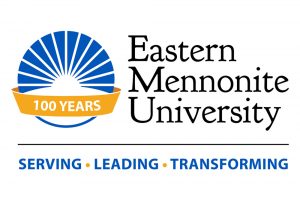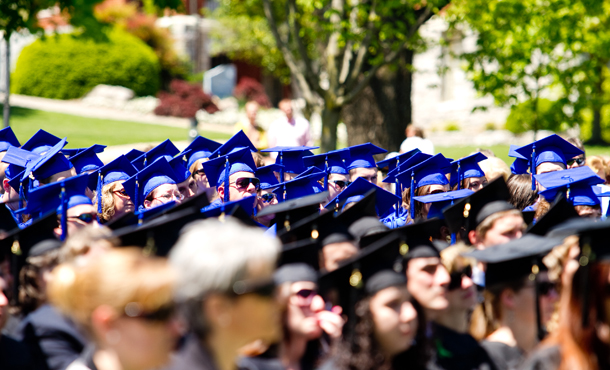Eastern Mennonite University 100th Commencement ceremony is Sunday, May 6, at 1 p.m. on the front lawn. The ceremony will be livestreamed on the university website. It will also be available live from the EMU Facebook page.
Events begin Friday, May 4, with seminary baccalaureate. Several departmental receptions, as well as commissioning and pinning ceremonies, will be hosted. For complete details, visit www.emu.edu/commencement.
Many undergraduates wear stoles, or vestments, at Commencement that are symbolic of their cross-cultural studies, a graduation requirement, or of their heritage, roots within one or various communities, or citizenship. These stoles were presented at the third annual Donning of the Kente ceremony earlier this month.

Ten students will wear Cords of Distinction that honor their “significant and verifiable impact” on the university and on student life, as well as contribution to the community and embodiment of EMU’s shared values. Read more about this distinguished group.
Nobel Laureate to give Commencement address
The 2018 Commencement address will be given by alumna and 2011 Nobel Peace Laureate Leymah Gbowee.
In recognition of her extraordinary achievement in peacebuilding and social justice work, EMU will award Gbowee its inaugural honorary Doctor of Justice degree.
“We are thrilled that our own graduate, Nobel Peace Prize Laureate Leymah Gbowee, will offer the commencement address in our centennial year, and on behalf of the EMU Board of Trustees, I look forward to the honor of bestowing upon her our first honorary doctorate of justice,” said President Susan Schultz Huxman. “As her inspirational work and message continue to be shared around the world, she is most deserving of this recognition from her alma mater.”
Gbowee earned a master’s degree in conflict transformation from EMU’s Center for Justice and Peacebuilding (CJP) in 2007.

Gbowee’s involvement in the peace movement began in the late 1990s, when she began volunteering with a trauma healing program in Liberia’s war-torn capital, Monrovia. Within a few years, Gbowee had become a leader of a grassroots women’s movement, the Women of Liberia Mass Action for Peace. Using demonstrations, sit-ins and other nonviolent tactics, the group eventually forced the country’s warring factions to negotiate and sign a peace agreement in 2003.
For her work in mobilizing women to help stop the Liberian Civil War, she shared the 2011 Nobel Peace Prize with Liberian President Ellen Johnson Sirleaf, the first female African head of state, and Tawakkol Karman, a Yemeni peace activist.
Gbowee currently serves as executive director of the Women, Peace and Security Program at the Earth Institute at Columbia University. She is the founder and current president of the Gbowee Peace Foundation Africa.
Connected to EMU
Since earning her degree, Gbowee has been a staunch supporter of her alma mater, most notably through her contributions to a groundbreaking program designed to build capacity and skills of women peacebuilders.
In 2011, Gbowee joined other female peacebuilding leaders from around the world for a consultation that laid the foundation for CJP’s Women’s Peacebuilding Leadership Program. Since 2012, fifty women from the South Pacific and Africa have earned graduate certificates in peacebuilding leadership and made great impacts in their local and regional areas.
Also in 2011, months before being awarded the Nobel Peace Prize, Gbowee returned to EMU to be recognized as the Alumna of the Year.
She delivered her first commencement address at EMU in 2014, when her oldest son Joshua Mensah graduated with a degree in digital media. Gbowee has said that she chose EMU because she wanted him to go to a Christian college that emphasizes community and peacebuilding.
Her most recent visit to campus, in 2015, was to support the International Student Organization’s fundraising activities dedicated to the Ebola outbreak.
Centennial history
View a timeline of 100 years of EMU history.
Eastern Mennonite University’s Centennial year (2017-2018) celebrates the transforming power of Christian higher education steeped in Anabaptist-Mennonite values through the institution’s past, present and future. A variety of events have joined alumni, faculty, staff, students, retirees and friends to share memories, commemorate important historic events, appreciate the university’s impact locally and beyond, and prepare for a fulfilling second century.

